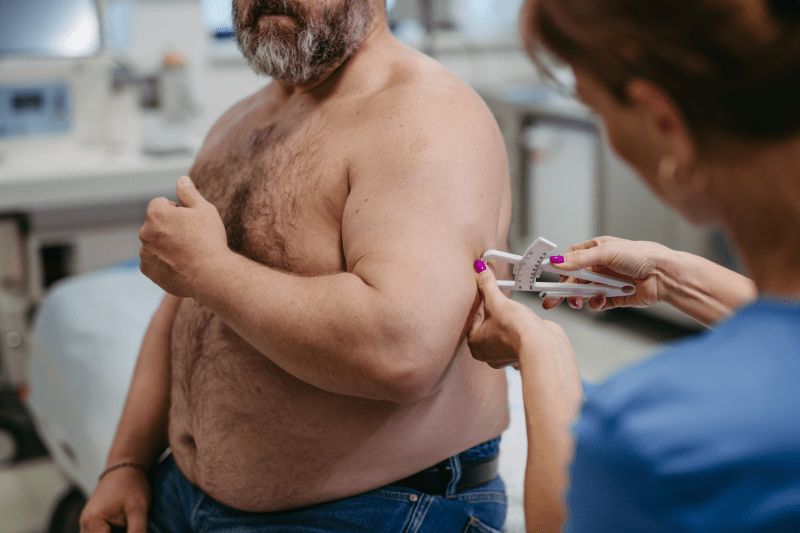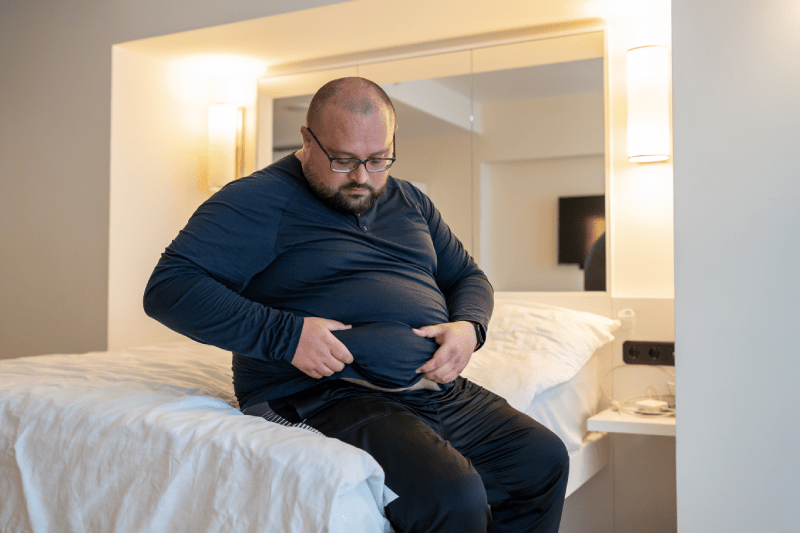Obesity has become one of the most common and insidious chronic diseases of modern life, representing a global public health crisis rather than merely an aesthetic concern. Defined as the excessive and abnormal accumulation of body fat to a degree that impairs health, obesity severely reduces an individual’s quality of life while laying the groundwork for a multitude of health problems that shorten life expectancy.
Especially in today’s fast-paced and digitized world, easy access to processed foods and a lack of physical activity accelerate the spread of this danger. This situation complicates weight management and makes surgical solutions an increasingly necessary option for long-term health.
The Root Causes of Obesity: Genetic and Environmental Factors
Obesity is complex and rarely develops due to a single cause; it typically arises from the interaction between genetic predisposition and adverse environmental factors. Some individuals have a genetic inheritance that makes their bodies more prone to storing fat and less sensitive to satiety signals.
However, this genetic tendency is triggered and accelerated when combined with a diet full of high-calorie, processed foods and a sedentary lifestyle. To be successful in obesity treatment, all of these genetic and environmental triggers must be understood and addressed, as lifestyle changes are mandatory for lasting success even after surgery.

The Impact of Poor Eating Habits on Rapid Weight Gain
The most direct cause of rapid weight gain is poor dietary habits that result in a caloric intake significantly greater than the body expends. Foods rich in sugary drinks, fast-food products, and refined carbohydrates, in particular, cause rapid energy spikes followed by sudden crashes, creating a constant feeling of hunger. This destructive cycle disrupts the body’s energy balance, leading to a swift accumulation of excess calories stored as fat. Gastric sleeve surgery physically breaks this vicious cycle, providing the necessary physical environment for the patient to establish portion control and restructure their eating habits successfully.
The Destructive Effect of a Sedentary Lifestyle on Metabolism
The desk-bound nature of modern work life and the dramatic drop in daily physical activity levels are key factors in the prevalence of obesity. Regular physical activity not only increases calorie expenditure but also boosts the metabolic rate and improves insulin sensitivity.
A sedentary lifestyle, conversely, leads to a slower metabolism, decreased muscle mass, and an increased tendency for the body to store fat. While obesity surgery offers a starting point to reverse this situation, increasing post-operative physical activity is an absolute requirement for the patient’s long-term success and sustained health benefits.
The Direct Link Between Obesity and Type 2 Diabetes
Obesity and Type 2 Diabetes (Sugar Disease) are two chronic conditions that mutually trigger each other. The excessive fat tissue accumulated in the body increases the cells’ resistance to insulin; this condition is known as insulin resistance.
The pancreas initially attempts to overcome this resistance by producing more insulin, but it eventually tires, leading to the development of Type 2 Diabetes. Gastric sleeve surgery, in addition to promoting weight loss, rapidly improves insulin sensitivity by altering the release of gut hormones. Therefore, bariatric surgery is recognized as one of the most effective treatment methods for the improvement or complete remission of diabetes.
The Harms of Obesity to Cardiovascular Health
Excess weight places a constant load on the cardiovascular system, bringing with it serious risks. Obesity increases risk factors such as high blood pressure (hypertension), high cholesterol, and elevated triglyceride levels, which significantly raise the risk of coronary artery disease, heart attack, and stroke. Weight loss, particularly the rapid and lasting weight loss achieved with gastric sleeve surgery, reduces or eliminates almost all of these risk factors. The surgery should be viewed as one of the most crucial steps taken to protect heart health and decrease the risk of serious cardiovascular events.
Joint and Mobility Problems Developed Due to High Weight
The excessive increase in body weight places an abnormal amount of strain on weight-bearing joints, especially the knees, hips, and spine. This continuous pressure causes the joint cartilage to wear down quickly, leading to the early onset of painful, mobility-limiting conditions like osteoarthritis (calcification). Restricted movement creates a vicious cycle by further immobilizing the patient and accelerating weight gain. The significant weight loss achieved with gastric sleeve surgery dramatically reduces the pressure on the joints, alleviating pain and restoring the patient’s ability to return to an active, fulfilling lifestyle.
Sleep Apnea and Obesity: Vital Risks
Obesity is one of the most common causes of sleep apnea. Excess fat tissue accumulated around the neck and throat causes the airway to partially or completely collapse during sleep. This condition leads to snoring, periods of breathing cessation, and severely compromised sleep quality. If left untreated, sleep apnea increases the risk of hypertension and heart diseases, in addition to causing daytime fatigue. Significant weight loss after gastric sleeve surgery typically eliminates or alleviates sleep apnea symptoms by reducing fat tissue in the airway, thereby vitally improving the patient’s overall health status.
Psychological Effects: Depression and Loss of Self-Confidence
The psychological effects of obesity are as profound as the physical ones. Societal stigma, exclusion, and continuous unsuccessful diet attempts can lead to serious psychological issues in patients with obesity, such as low self-esteem, anxiety, and depression. The decision to undergo surgery and the successful weight loss achieved afterwards fundamentally improve not only the patient’s physical appearance but also their mood, social interaction, and self-confidence. Bariatric surgery represents a crucial turning point in the weight management process, helping the patient to rebuild their psychological well-being.
The Necessity of Accepting Obesity as a Disease
It is of great importance to recognize obesity not merely as a lack of willpower or a lifestyle choice, but as a chronic disease stemming from complex physiological and hormonal imbalances. This acceptance facilitates patients’ access to correct treatment and increases the seriousness of the approach to therapy. Bariatric surgery, as one of the most potent tools in obesity treatment, offers a scientific solution to this chronic disease and plays an effective role in extending the patients’ quality and duration of life significantly.
What is Gastric Sleeve Surgery?
Gastric sleeve surgery is a bariatric procedure performed by surgically removing a large portion of the stomach (approximately 75% to 85%), resulting in the remaining stomach section taking on the shape of a banana or tube. This surgery works by physically restricting food intake, as the stomach volume is drastically reduced. However, its most important effect is the removal of the fundus part of the stomach, where the hunger hormone known as Ghrelin is largely secreted. This hormonal change reduces patients’ appetite and increases satiety, supporting permanent and sustainable weight loss.

The Mechanism of the Surgery: How Does It Cause Weight Loss?
Gastric sleeve surgery promotes weight loss through two fundamental mechanisms: Restriction and Hormonal Change. Restriction results from the stomach’s reduced size, which allows the patient to feel full quickly with small portions. The hormonal mechanism is activated by removing the Ghrelin-producing part of the stomach. The decrease in Ghrelin levels reduces the signals sent to the brain’s hunger center, thereby suppressing the appetite. This dual effect creates an environment for permanent and sustainable weight loss that diet and exercise alone often fail to achieve.
Ideal Candidate Criteria for Gastric Sleeve Surgery
Ideal candidates for gastric sleeve surgery are generally individuals with a Body Mass Index (BMI) of 40 and above, or those with a BMI between 35-40 who have serious health problems (comorbidities) related to obesity, such as Type 2 Diabetes, hypertension, or sleep apnea. Candidates must also be willing and psychologically ready to commit to post-operative lifestyle changes and long-term follow-up care. Experts working with Cure Holiday in Turkey meticulously evaluate each patient’s suitability for these criteria to ensure the safest and most effective decision.
Operation Duration and Advantages of the Laparoscopic Method
Gastric sleeve surgery is performed using the minimal invasive laparoscopic method, which is considered the gold standard in modern bariatric surgery. In this technique, only a few small incisions are made in the abdominal area, and the operation is carried out with the help of specialized surgical instruments and a camera. The operation duration typically ranges between 1 and 2 hours. The advantages of laparoscopy include less blood loss, reduced pain, a shorter hospital stay (usually 3 nights), and much smaller, nearly invisible scars. This significantly enhances both the patient’s recovery comfort and the aesthetic outcome.
The Effect of Gastric Sleeve on Obesity-Related Diseases
Gastric sleeve surgery has an incredibly powerful curative effect on comorbidities developed due to obesity. A large majority of patients experience complete remission or excellent control of Type 2 Diabetes, decreased high blood pressure, and resolution of sleep apnea syndrome. These improvements stem not only from weight loss but also from the positive changes in gut hormones triggered by the surgery. For this reason, gastric sleeve surgery is often considered a “metabolic” surgery rather than merely a “weight loss” operation, due to its profound systemic health benefits.
Post-Operative Nutrition and Lifestyle Changes
Gastric sleeve surgery is not a magic wand alone; the secret to lasting success lies in strictly adhering to post-operative nutrition and lifestyle changes. Patients follow a rigid staged progression from liquid to pureed and then solid foods, during which portion sizes are permanently reduced. High protein intake, low-fat and sugar-free nutrition, regular fluid consumption, and a daily exercise habit are vital for the efficient functioning of the new stomach and for long-term weight control. Cure Holiday provides detailed nutritional guides and ongoing support to its patients regarding this crucial phase.
Potential Risks and Safety Precautions of Gastric Sleeve Surgery
Gastric sleeve surgery is a major surgical procedure and, like all operations, carries certain potential risks. These risks include leakage, bleeding, infection, and anesthesia-related complications. Safety precautions are maximized by ensuring the surgery is performed by highly experienced bariatric surgeons in a JCI accredited, fully equipped hospital. Leading centers in Turkey aim to minimize these risks to levels below the global average through the use of minimal invasive techniques and stringent sterilization protocols, ensuring patient safety is paramount.
Expected Weight Loss Rates in the First Year After Surgery
Gastric sleeve surgery provides dramatic and rapid weight loss within the first year. The majority of patients lose an average of 60% to 80% of their excess weight within the first 12 to 18 months. The rate of weight loss varies depending on the patient’s initial BMI, age, and adherence to the post-operative diet and exercise program. The fastest weight loss typically occurs within the first 6 months. Regular doctor and nutritional follow-up during this period is critical for maintaining motivation and achieving healthy, sustainable goals.
Long-Term Success of Gastric Sleeve Surgery
Gastric sleeve surgery is an extremely successful method for long-term weight control. Research indicates that a large majority of patients maintain a loss of over 50% of their excess weight even 5 years and beyond after the operation. The key to long-term success is to be mindful of the stomach’s potential for growth, to turn nutritional rules into a permanent lifestyle, and to diligently attend regular check-ups by the surgeon and nutritionist. Cure Holiday supports this success by offering long-term follow-up as a standard component of their care.
Importance of Vitamin and Supplement Use After Operation
Gastric sleeve surgery alters the stomach’s ability to digest food and absorb nutrients. Because the acid-producing portion of the stomach is reduced, the absorption of vital vitamins and minerals, particularly B12, iron, calcium, and Vitamin D, decreases. Therefore, it is mandatory for patients to take vitamin and mineral supplements regularly for life, as advised by their doctor or dietitian, after the surgery. These supplements prevent nutritional deficiencies, ensuring the patient remains healthy and energetic in the long run.
Paris: The High Cost of Luxury Healthcare Services
As one of the world’s most expensive cities, Paris carries a luxury price tag for healthcare services. The cost of complex surgical procedures like gastric sleeve surgery is significantly above the European average due to high living standards, astronomical rental expenses for clinics, and elevated surgeon/personnel salaries. Undergoing surgical treatment in Paris means paying not only for a qualified procedure but also for the high operating costs of one of Europe’s most prestigious metropolises, potentially making the treatment inaccessible for many international patients.
Gastric Sleeve Surgery Prices in France: Detailed Analysis
The cost of a Gastric Sleeve operation in a private clinic in France typically ranges between €12,000 and €20,000, depending on the surgeon’s experience and the hospital’s prestige. This figure often covers only the surgical procedure, anesthesia, and a short hospital stay. In contrast, packages offered by Cure Holiday in Turkey, which cost only 20-30% of this price, include accommodation, transfers, interpretation, and long-term follow-up in a comprehensive structure. Prices in France may also contain hidden costs that complicate budget planning for international patients.

Comparison of Surgical Costs in Paris with Turkey
The cost of the surgical service alone in Paris is 3 to 5 times higher than the total cost of an all-inclusive, perfectly organized package from Cure Holiday in Turkey, which covers 5-star accommodation and VIP transfers. This massive price difference is possible thanks to Turkey’s lower operating costs and high patient volume. Turkey thus achieves an unrivaled financial superiority without compromising on the quality of care. For those seeking the best value for their money in health tourism, the comparison clearly points toward Turkey.
Reasons for the High Price Tag: Rent and Operational Expenses
The main reasons for the high cost of healthcare services in Paris are the city’s exorbitant real estate and operating expenses. The rent for an operating room, personnel taxes, and insurance costs in a prestigious clinic are significantly higher than those in a Turkish clinic. These costs are directly passed on to the patient’s bill. This implies that the high price paid by the patient corresponds largely to the cost of the geographical location and the luxury operating environment, rather than a necessarily superior quality of surgical operation itself.
Quality Standards and Accreditations of Hospitals in Paris
Hospitals in France are subject to the European Union’s strict health regulations and maintain high hygiene and safety standards. However, for international patients, globally recognized accreditations like JCI (Joint Commission International) are important. Many hospitals working with Cure Holiday in Turkey hold these accreditations, which represent the highest standards for international patient safety and care, thereby offering the same, or sometimes even higher, quality service guarantee as Parisian hospitals.
Long Waiting Times and Appointment Difficulties
The most experienced and renowned bariatric surgeons in Paris often have long waiting lists due to intense local and international demand. International patients may have to wait for months to get a surgery date that suits them. These long appointment waiting times pose a significant hurdle, especially for patients whose health issues require urgent intervention or who wish to expedite the process. Cure Holiday, thanks to its optimized patient flow management, offers patients faster and more flexible treatment start dates.
Lack of Comprehensive Package Services in Parisian Clinics
Many clinics in France do not offer comprehensive “all-inclusive” packages for international gastric sleeve patients. The patient is expected to organize their own logistics, such as accommodation, airport transfers, specialized nutritional counseling, post-operative care kits, and, most importantly, interpretation services. These logistical challenges add an extra layer of burden to the already stressful surgical process and negatively impact patient comfort. Cure Holiday, on the other hand, seamlessly provides all these details under one roof.
French Language Barrier and Interpreter Costs
Even if English is spoken in France, given the sensitivity of surgical and medical terminology, small misunderstandings in communication can carry significant risks. Clinics generally do not provide professional medical interpreters as a standard service, forcing the patient to either find their own interpreter or make important decisions while navigating a language barrier. Cure Holiday completely eliminates this risk with free, experienced, native-language personal coordinator and interpreter support accompanying you at every stage of the operation.
High Cost of Post-Operative Accommodation and Living Expenses
Finding comfortable and suitable accommodation for rest and recovery after surgery in Paris is quite expensive. The cost of staying for several days or a week during the sensitive post-operative period significantly increases the overall budget. In contrast, Cure Holiday’s all-inclusive packages offer 5-star hotel accommodation and VIP transfers within the price that you would pay for the surgery alone in Paris, preventing patients from worrying about extra accommodation expenses.
Logistical Difficulties of Long-Term Follow-up in France
Long-term follow-up after gastric sleeve surgery is vital for the permanent success of the operation. It is both costly and time-consuming for international patients who have undergone surgery in France to return for follow-up. French clinics often do not offer remote follow-up systems as organized as those in Turkish centers. This situation can cause patients to face difficulties in receiving follow-up support after returning to their home countries, which is a critical impediment to achieving long-term success.
General Disadvantages of Receiving Treatment in Paris
The general disadvantages of undergoing gastric sleeve surgery in Paris are clear and tangible: excessively high cost, the complexity of logistical organization, long waiting lists, and the lack of comprehensive post-operative package services. The high price does not guarantee the experience of an internationally proven bariatric surgeon or the JCI accreditation of Turkish hospitals. Therefore, Paris is a poor choice for international patients seeking cost-effectiveness and comprehensive service comfort.
Turkey: The Global Center for Bariatric Surgery
Turkey, particularly in the field of obesity surgery, has accumulated immense experience and expertise over the last decade. Due to the high volume of international patient traffic, Turkish bariatric surgeons see far more cases than their counterparts in the West, achieving high success rates even in challenging and diverse cases. Turkish clinics utilize the latest laparoscopic technology and provide services in fully equipped hospitals that hold JCI accreditation, recognized as best practice internationally. This experience and volume have made Turkey a reliable global center.
Gastric Sleeve with Cure Holiday: Quality, Comfort, and Economy
Cure Holiday manages the bariatric surgery process for international patients based on the principles of the highest quality, maximum comfort, and unrivaled economy. It collaborates only with the most experienced surgeons who have the highest case volumes. Cure Holiday combines the entire process (surgery, 5-star accommodation, VIP transfers, interpretation, and follow-up) into a single, transparent, and affordable package, allowing patients to focus solely on their recovery. As a result, patients receive first-class service at a fraction of the cost of Paris.
Turkey’s Price Advantage: Up to 70% Savings Compared to Paris
The cost of a Gastric Sleeve operation in Turkey is up to 70% lower than the cost of an equivalent surgical service in Paris. This significant saving is based on Turkey’s lower operating costs and its commitment to health tourism. This allows patients to secure their health while also saving money for a new life after treatment without straining their budget. Achieving such a substantial financial advantage without compromising quality makes Turkey the most attractive destination.

The Unique Experience Gained from the High Case Volume of Turkish Surgeons
Bariatric surgeons in Turkey possess unparalleled experience thanks to the high volume of cases brought by international patient traffic. This intensive practice has enhanced the surgeons’ ability to manage rare complications, determine the most suitable laparoscopic approach for the most complex cases, and maximize the permanence of the operation results. The success of the surgery depends more on the surgeon’s experience than the technology used; and this experience is proven by the high case volume in Turkey.
The Scope of Cure Holiday’s All-Inclusive Packages
Cure Holiday packages are designed to eliminate stress for international patients and are far more comprehensive than what Paris offers: The package includes the surgery by an expert bariatric surgeon, 3-4 Nights of 5-Star Hotel Accommodation, VIP transfer service from the airport onwards, all necessary medications and care kits after the surgery, pre- and post-operative dietitian consultation, along with 24/7 Personal Patient Coordinator and Medical Interpreter Support in the native language throughout the entire process.
International JCI Accreditations of Hospitals in Turkey
Most hospitals collaborating with Cure Holiday hold the Joint Commission International (JCI) accreditation, the international gold standard for healthcare quality. This accreditation proves that the hospitals adhere to American standards in terms of patient safety, sterilization, infection control, and the quality of surgical processes. This strong assurance means international patients will find the same level of safety and quality in Turkey as they would in the best hospitals in their home countries or in Paris.
Uninterrupted Native-Language Interpreter Support Before and After Surgery
Professional medical interpreter support, which is difficult and expensive to find in France, is a standard and complimentary service with Cure Holiday in Turkey. The personal coordinator accompanies the patient in their native language at every step, from consultations to discharge. This is a critical factor for comfort and safety, ensuring the patient fully understands medical instructions, can express their concerns easily, and feels secure and comfortable throughout the treatment process.
5-Star Accommodation and VIP Transfer Comfort
Comfort and hygiene are crucial during the post-operative recovery period following gastric sleeve surgery. Cure Holiday packages offer accommodation in luxury 5-star hotels and private transfers with luxury VIP vehicles from the airport to the clinic. This level of comfort eliminates the high-cost and stressful process that the patient would have to organize independently in Paris. Patients can focus on their recovery while logistical details are managed perfectly by Cure Holiday.
Post-Operative Nutrition Counseling and Long-Term Follow-up
The long-term success of gastric sleeve surgery is dependent on post-operative dietary habits. Cure Holiday provides regular nutritional counseling sessions and doctor follow-up during the first year after surgery. Patients receive continuous support for up to one year, even after returning to their home countries, through online consultations and photo tracking. This long-term commitment ensures patients sustain their weight loss goals and permanently establish healthy eating patterns, a guarantee often absent in Paris.
Safety and Sterilization Standards of the Treatment Process in Turkey
Turkey adheres to strict protocols regarding surgical safety and sterilization, especially due to JCI accreditation. Operations are performed in modern operating rooms with minimized infection risk, accompanied by experienced bariatric anesthesia specialists. The use of international-standard equipment and sterilization methods aims to reduce the patient’s surgical risks and ensure a successful recovery process. This meticulousness solidifies the reliability of treatment in Turkey.
Reclaim Your Youth and Health with Cure Holiday
The decision for obesity surgery is the most important decision that will change your life. Instead of the high-cost and logistically complex offerings of Paris, seize the opportunity to receive treatment with Cure Holiday in Turkey, which offers a combination of an internationally proven expertise, superior technology, and all-inclusive comfort that is also budget-friendly. This route, trusted by thousands of international patients, opens the doors not only to weight loss but also to a longer, healthier life free from obesity-related diseases.
Gastric Sleeve Surgery: The Clear Address for Cost-Effectiveness
In a vital procedure like gastric sleeve surgery, cost-effectiveness means achieving the best value without compromising quality. Turkey perfectly balances this equation thanks to its high case volume and competitive price structure. When comparing the surgical fee you would pay alone in Paris with the full package service you receive in Turkey, Turkey’s superiority in cost and comfort is an undeniable reality. This represents a smart and conscious health tourism decision.
Psychological Advantages of Receiving Treatment with Cure Holiday
The personal coordinator and interpreter support provided by Cure Holiday eliminates the risk of the patient feeling alone or helpless abroad. The perfect organization of all logistical details (transfers, accommodation, hospital procedures) allows the patient to focus their mental energy solely on the recovery process. This psychological comfort and a stress-free experience are important factors that positively affect the speed of post-operative recovery and the overall success of the procedure.



